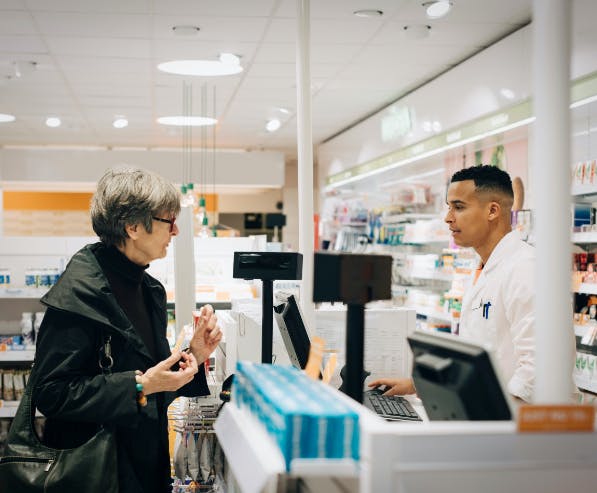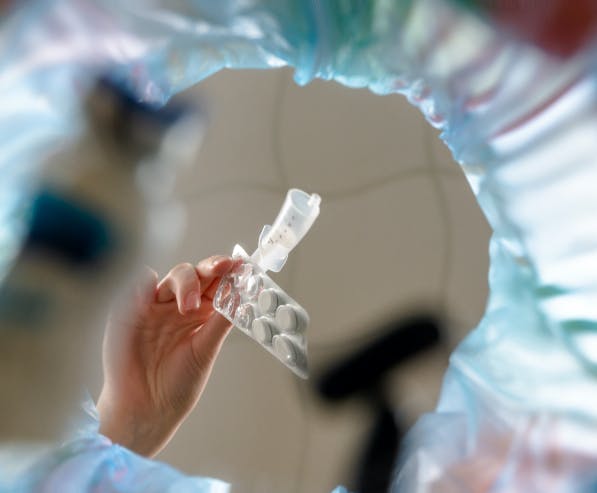How to Dispose of Medicines
People today use many different kinds of medications that will eventually require disposal. However, research suggests that many people are not aware of how to properly dispose of medication that is unused, unwanted or expired. Increasing awareness on appropriate medication disposal practices is key to protecting our loved ones and our environment. When it comes to managing your health and medicine disposal, your healthcare provider is the first person to talk to but we’re here to tackle some of the most common questions people have.
How should you dispose of old medicines?
Throwing away medicines in the bin isn’t recommended, as children or pets can easily get their hands (or paws) on something that they shouldn’t be putting in their mouths.
If you’ve checked the expiry dates on medication and discovered you need to get rid of them, you should know that pharmacies in many countries are legally required to take back unwanted, unused, or expired medication.1
Pharmacies will then work with manufacturers or local councils to safely dispose of any medication you don’t need.2 This is a handy option, as you can take along any medications that you need to dispose of, while collecting your prescription or picking up other things you need at the pharmacy.
If you’re ever in doubt about the best way to dispose of your medicines, have a chat with your doctor or pharmacist.
Can I share my unused medicine with others?
If you have been prescribed medicine and not used the full quantity, you may wonder whether you can pass it on for others to use.
However, unused medication could be dangerous for anyone it hasn’t been prescribed to, due to allergies, an incorrect dosage, potential side effects, and more.3 Doctors are trained to check a patient’s personal information, such as pre-existing conditions or other medication they are taking, before prescribing any medicine for this reason.
To stay on the safe side and avoid putting others at risk, don’t pass on medication to someone it hasn’t been prescribed to.
Can I flush medicines down the toilet?
Flushing medication can harm your environment so isn’t recommended. Return them to your pharmacy if you can – and follow these extra tips on making sure your medicine disposal is done safely:
- Do not crush your medication
- Remove the label or make it illegible if you have to throw it in the bin 4
- If you’re applying topical pain gels, remember to wipe your hands after application on a paper towel and throw this in the bin rather than washing hands. You should also wait until the product dries before taking a shower or bath.5 This helps to prevent excess product getting into our drinking water systems.
Environmental impact of improper medicine disposal
Along with keeping members of your house safe, medicine disposal is also important for the environment. Disposing of medicines incorrectly, such as into the water supply, could potentially harm others and cause unnecessary pollution.
Most water-work systems aren’t built to deal with medicines. As well as possibly exposing others to chemicals, pouring drugs down the drain or into the toilet can contaminate natural water sources, eventually harming fish and other marina wildlife in the process.6 To treat our environment right, it’s always wise to think before you rinse!
How can you help reduce medication waste?
There are several things you can do to prevent ordering too much medicine, which will ultimately result in reduced waste and decreased cost burden. A few tips include:
- Tell your doctor or pharmacist if you’ve stopped taking any of your medicines
- Check what medicines you still have at home before re-ordering
- Discuss your medication regularly with your doctor or pharmacist
- Only reorder prescriptions that you need
- If you are hospitalized, try to remember to take your medicines with you in a clearly marked bag.7
In regard to cost burden, to put things in perspective, the money spent on unused prescription medications in the UK could pay for: 8
- 80,906 more hip replacements
- 101,351 more knee replacements
- 19,799 more drug treatment courses for breast cancer
- 11,778 more community nurses
- 300,000 more drug treatment courses for Alzheimer's
Even small changes can help reduce the burden of medication waste. You can help make a difference!
Disposing of asthma inhalers
In many countries, you can also dispose of asthma inhalers by returning them to pharmacies. The pharmacy can then arrange for the plastic and aluminium parts to be recycled. 9
This also helps our environment, preventing any leftover inhaler gas from being released into the atmosphere which would contribute harmful carbon emissions.10

How to dispose of painkillers
Painkiller pills like paracetamol or ibuprofen, along with the blister packs and cardboard inserts they come in, can be returned to local pharmacies in many countries.11 They can recycle the packaging and ensure any leftover medicine ends up in the right place – whether this be with manufacturers or with local councils for safe disposal.
The same advice goes for topical pain gels, patches, suppositories, and soluble tablets. Reducing residual waste with medicine is easy to do when you follow these simple steps.
Treating your environment just as well as you treat yourself is all about thinking about your everyday actions and their impact to live responsibly and look after the health of our planet.
Whatever medication you’re using be sure to dispose of it right – following this guide is a great way to do your bit and use medication responsibly.
Whatever’s on your mind, we can put it right.
Let’s Dispose of It Right.
SHARE THIS ARTICLE
1 Disposal of Unwanted Medicines, PSNC | https://psnc.org.uk/services-commissioning/essential-services/disposal-of-unwanted-medicines/ Accessed 28/07/2021
2 Disposal of Unwanted Medicines, Perville Chemists | https://www.perivillechemists.co.uk/service/disposal-of-unwanted-medicines/ Accessed 25.08.2021
3 Why You Shouldn’t Share Medication, Weldricks | https://www.weldricks.co.uk/news/why-you-shouldnt-share-medication, Accessed 28/07/2021
4 Safe Medicine Disposal, Health Era | https://www.healthera.co.uk/blog/safe-medicine-disposal Accessed 28/07/2021
5 Topical Diclofenac, Global Data Sheet 2020: p6
6 Don’t Flush Medicines Down the Drain, PCA | https://www.pca.state.mn.us/featured/dont-flush-medicines-down-drain Accessed 28/07/2021
7 Only Order What You Need, Medicine Waste, http://www.medicinewaste.com/help accessed 31/08/2021
8 MedicineWaste,NHS|https://www.nhs.uk/Services/User
Controls/UploadHandlers/MediaServerHandler.ashx?id=42356&t=636729324805601697 Accessed 28/07/2021
9 What to do with Inhalers, RecycleNow | https://www.recyclenow.com/what-to-do-with/inhalers-0 accessed 25.08.21
10 Incorrectly Recycling Your Inhaler is Damaging the Environment, Evening Standard | https://www.standard.co.uk/news/health/incorrectly-recycling-your-inhaler-is-damaging-the-environment-a3623266.html Accessed 28/07/2021
11 Medicines, Recycle Now | https://www.recyclenow.com/what-to-do-with/medicines-0 Accessed 28/07/2021

Let's treat it right and Panadol
Find out more, including usage and dosage guidance for pain relief treatments, from Panadol.

Let's treat it right and Voltaren
Find out more about the right use of pain relief medicines, including dosing and disposal advice, from Voltaren.




